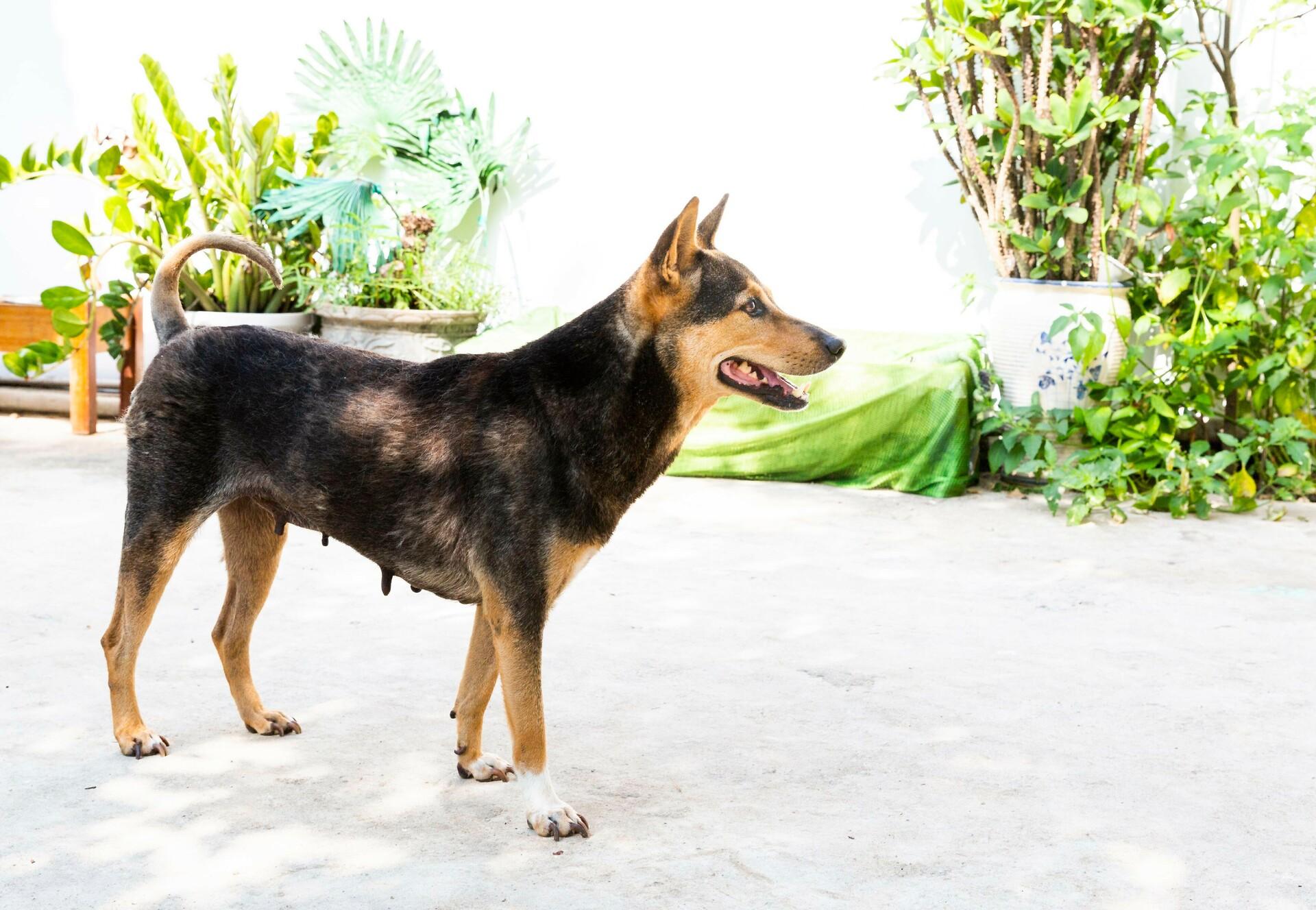
Hot Asphalt
A danger to your dog’s paws
The high heat of summer can become extremely hazardous for your dog's paws. There is a simple test in which you can do to check whether the pavement is too hot for your pet's paws by doing the “seven-second test”. Simply touch the pavement with the back of your hand for seven seconds. If you can’t hold out for the full seven seconds because the surface is too hot, then it’s also too hot for your dog’s paws.
When it is too hot for dog paws
If the air outside is pleasantly warm, you may think there is no risk that your dog’s paws will get burnt. But the ground can get much hotter than the surrounding air5. The table below compares the temperatures of the air and asphalt under similar conditions:
| Air temperature | Asphalt temperature |
| 25 °C / 77 °F | 52 °C / 125 °F |
| 31 °C / 87 °F | 62 °C / 143 °F |
| 35 °C / 95 °F | 65 °C / 149 °F |
What’s more, some surfaces get hotter than others. A study by Frostburg University has shown that when concrete reaches a temperature of 40 °C, under similar conditions brick can get as hot as 43 °C and asphalt 51 °C.6
Symptoms of burns
- The affected area is reddened and swollen (1st degree)
- Clear blisters are visible (2nd degree)
- The skin is charred (3rd degree)7

First aid for burnt paws
If your dog has burns on its paws, you should always consult a vet as soon as possible, and in the meantime, you will need to cool down the affected paws. The following first-aid measures are the ones most commonly recommended by vets:
- Cool the affected paws under slow running water (the water should not be ice-cold).
- Bandage each affected paw or, failing that, protect it with a clean sock.8
Take special care if using ice on your dog’s burnt paws: improper handling of ice can cause tissue damage.
How to avoid burns
Burns can be avoided by taking the following precautions9:
- Do the “seven-second test” before walking your dog.
- Walk your dog on grass or in meadows.10
- Walk your dog at times when the ground is cooler – early in the morning or late in the evening.11

Source
2. Hudak P. Lawns Too Hot for Dogs in Warm Weather. Journal of Applied Animal Welfare Science. 2021;0(0):1–6. doi:10.1080/10888705.2021.1891541
3. Hudak P. Warm Air Leads to Hazardous Ground Temperatures When Walking Dogs in Built and Natural Environments: Hazardous Ground Temperatures When Walking Dogs. Pet Behaviour Science. 2022;(12):31–42. doi:10.21071/pbs.vi12.13733
4. Vets Now Team. Why dog owners should avoid pavements and fake grass on hot days. Vets Now. 2017 [accessed 2023 Oct 17]. https://www.vets-now.com/2017/06/never-walk-dogs-hot-asphalt-tarmac-pavements-artificial-grass/
5. Harrington WZ, Strohschein BL, Reedy D, Harrington § JE, Schiller WR. Pavement Temperature and Burns: Streets of Fire. Annals of Emergency Medicine. 1995;26(5):563–568. doi:10.1016/S0196-0644(95)70005-6
6. Frostburg State University Study_A STUDY OF THE SURFACE TEMPERATURES OF SIX GROUNDCOVERS ON THE FROSTBURG STATE UNIVERSITY CAMPUS.pdf. [accessed 2023 Oct 17]. https://www.frostburg.edu/student-life/rmsc/_files/pdf/projects/2008heat.pdf
7. ERSTE HILFE BEIM HUND - Verbrennungen. [accessed 2023 Oct 17]. https://www.erste-hilfe-beim-hund.de/cgi-php/rel00a.prod/joomla/Joomla_1.6/index.php/verbrennungen2
8. Erste Hilfe beim Tier bei Verbrennungen. [accessed 2023 Oct 17]. https://www.tiermedizinportal.de/erste-hilfe/erste-hilfe-beim-tier-bei-verbrennungen#wbounce-modal
9. tier. Verletzte Hundepfote: Ursachen & Tipps. Tiergesund.de. 2017 [accessed 2023 Oct 17]. https://www.tiergesund.de/haltung-pflege/hund/hundepfote-verletzt-tipps/
10. Yazwinski T. Experts warn dog owners after pet’s pads burn off during walk. WBMA. 2019 Jun 19 [accessed 2023 Oct 17]. https://abc3340.com/news/nation-world/experts-warn-dog-owners-after-pets-pads-burn-off-during-walk-06-19-2019-133757551
11. Mann S. Canine heat-induced hyperthermia and owner education. The Veterinary Nurse. 2012;3(8):478–484. doi:10.12968/vetn.2012.3.8.478

